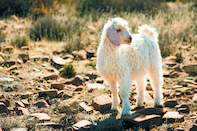
Mohair South Africa, having assumed the responsibility of the South African mohair production industry, has developed a sustainability programme in order to implement and maintain sustainability practices in the industry through economic, environmental, animal-wellbeing and social principles.
The economic principle serves to ensure economically viable farm practices take place. Soil management and the production of crops, livestock, veld and forage resources as well as the conservative use of soil, climate, energy, land and water resources all working to maintain or enhance economic return to the producer.
The environmental principle of Mohair South Africa’s sustainability programme is about maintaining the essential goods and critical, life-supporting resources that society derives from the environment and its ecosystems. Therefore guidelines have been put in place to ensure natural assets and biological and agricultural resources are protected and sustainably used through eco-conscious farming practices. Vegetation is also protected from the overgrazing of Angora goats.
The sustainability programme also serves the protection of the Angora goats directly through its animal-wellbeing principle. Mohair producers and Angora farming enterprises must accept responsibility for providing adequate nutrition for the Angora goats’ maintenance, growth and reproduction. Adequate environmental resources, protection from predation and protection from life-threatening weather conditions for the Angora goats is to be provided. Mohair South Africa also implements the ‘Animal Health Act 35 of 1984’ under the animal-wellbeing principle to promote animal health, control animal disease and regulate the importation and exportation of animals.
The final principle of the sustainability program is the social principle which serves to ensure rights and well-being of employees and the local community are protected and upheld with the production of mohair in accordance with labour relations.
 A wide variety of mohair products are produced in South Africa including socks, blankets, duvets, scarves, as well as a range of other cloth...
A wide variety of mohair products are produced in South Africa including socks, blankets, duvets, scarves, as well as a range of other cloth...